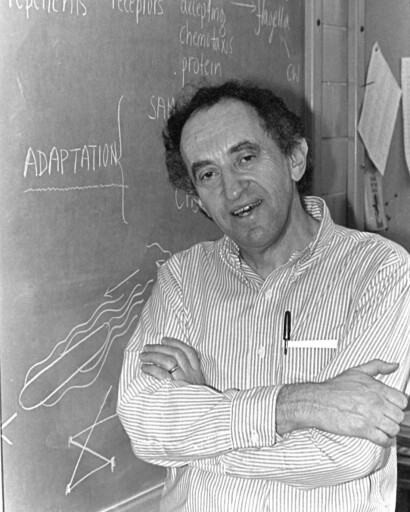

Julius Adler
April 30, 1930 — April 2, 2024
Madison
Julius Adler died on April 2, 2024, of congestive heart failure, in his home in Oakwood Village, Madison.
He was born on April 30, 1930 in Edelfingen, a tiny village in southern Germany, to Irma (Stern) Adler and Adolph Adler. His love of the natural world began in the rolling hills around Edelfingen, chasing butterflies. This childhood love of butterflies ultimately led to his interest in biology and eventually biochemistry and genetics. His love of nature lasted all his life and influenced everything he ever did.
In 1938, when Julius was eight, he, his parents, sister Helen and several uncles left Germany to escape from the Nazis, and came to America. They settled in Grand Forks, North Dakota because other family members had immigrated there before.
Julius attended grade school and high school in Grand Forks, starting out without knowing one word of English and ending as the valedictorian of his high school class. After high school he went to Harvard, where he received a bachelor’s degree in biomedical sciences in 1952. In 1957 he earned a PhD in biochemistry in Henry Lardy’s lab at the University of Wisconsin, Madison, and then went on to do postdoctoral work at Washington University, St. Louis, and Stanford. In 1963 he married Hilde Wohl, who had also escaped from Nazi Germany as a child. They had two children, David and Jeane.
In 1960 Julius returned to the University of Wisconsin as an assistant professor in the Departments of Biochemistry and Genetics. There he discovered how bacteria sense attractants and repellants; this research, the study of “Chemotaxis,” was carried out for 40 years. Julius opened up this field; there are now over 1000 scientists, worldwide, studying it.
Julius mentored and guided a large number of undergraduates, graduate students and postdoctoral fellows in his lab. Along with teaching them to do meticulous scientific research, he modeled ethics, honesty and kindness. He took his students on canoe trips and hikes along the Wisconsin river and other scenic places. Many went on to illustrious careers in science. Many have continued to speak of his profound influence in their scientific as well as personal lives.
In later years Julius studied attraction and repulsion in fruit flies. He retired in 1996, but continued an active lab for many years after his retirement and continued to go to his campus office every weekday until the Covid pandemic stopped him in 2020. He received numerous local, national and international awards and honorary lectureships for his excellent work, including a Hilldale Award and named professorship from the University of Wisconsin and election to the prestigious National Academy of Sciences in in 1978, when he was only 48.
Julius never tired of watching and studying natural phenomena and loved to spend time, “in nature,” the wilder the better. Many Saturdays or Sundays he explored the wilds of Wisconsin, preferably by himself. One summer he went to a different bog every Saturday; another summer he looked for “virgin uncut pines” all over the state. He canoed on any wild river he could find. This was before the days of cell phones, so the family often worried and wondered about where and how he was! He loved the southwest desert in bloom. He went on safari to Africa and explored the Amazon in Peru and Brazil.
He also loved nature close to home. For much of his working life, Julius walked daily from his home in Shorewood Hills along the shore of Lake Mendota to his lab, studying and examining everything along the way – ducks on the lake, cocoons, ants, worms, flowers and trees - everything. He had a reverence for all living creatures. He loved the beauty of the snow falling down. He loved the full moon.
Julius’ other great interests were the study of Judaism and Jewish history, and his family’s history and genealogy. He hand wrote family trees that went back for centuries. To accomplish this, he went back to Germany to study the cemeteries where his ancestors were buried, and with his particular kind of determination he tried to track down every living relative on the planet. He periodically invited recently discovered, previously unheard-of relatives for the weekend. For 55 years, he presided over large Chanukah parties and Passover Seders in his Shorewood home and later at Oakwood Retirement Community.
Julius heard his own drummer and followed that beat in everything he did. He lived life on his own terms, with an ever-present sense of wonder and without compromise. He loved his family. He was unassuming, humble and unfailingly gracious to everyone, always.
Julius is survived by Hilde, his wife of 60 years, son David Adler (Mary Elizabeth), daughter Jeane McMahon (Dan), grandson Jackson McMahon, granddaughter Mari Adler Leo, great granddaughter Isabelle Adler Leo, sister Helen Adler, three special nieces and many beloved cousins, and other relatives.
Funeral Services will be held Tuesday, April 9, 2024 at 12 noon at Temple Beth El, 2702 Arbor Drive, Madison. Memorials can be made to the Leo Beck Institute (which preserves the history of the German Jews), 15 West 16th St., New York, NY 10011, Temple Beth El, Madison, the Oakwood Foundation, or any charity of your choice.
We loved Julius and we miss him beyond words.
Service Schedule
Past Services
Funeral Service
Tuesday, April 9, 2024
Starts at 12:00 pm (Central time)
Temple Beth El
Guestbook
Visits: 915
This site is protected by reCAPTCHA and the
Google Privacy Policy and Terms of Service apply.
Service map data © OpenStreetMap contributors
